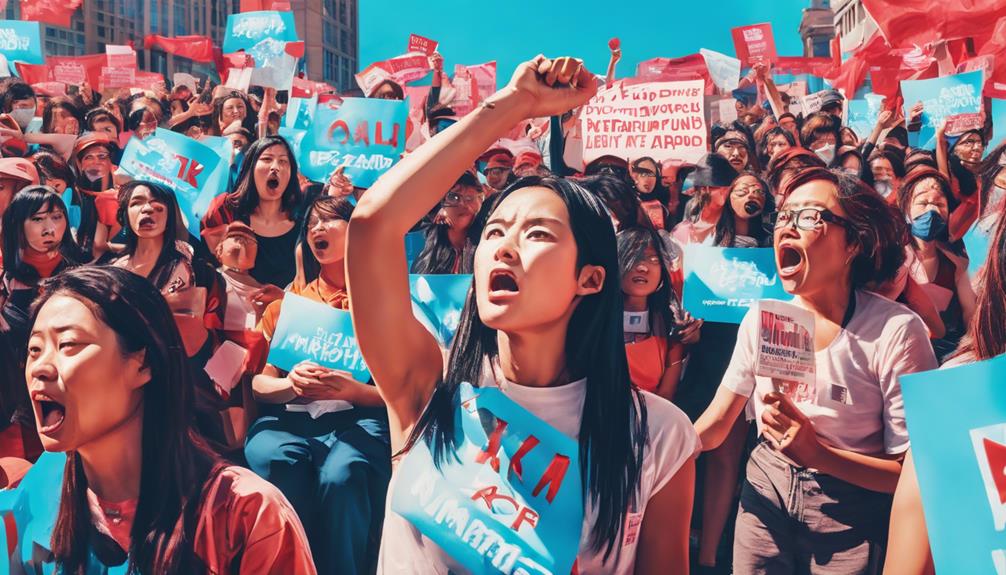Nadya Okamoto's fight for menstrual equity is reshaping how society views menstruation. You might know her as the founder of the nonprofit PERIOD, started at just 16. Her work addresses period poverty, pushing for access to menstrual products and eliminating the stigma that surrounds menstruation. Okamoto's campaigns also tackle the tampon tax, advocating for menstrual products to be seen as essential. With over 800 chapters worldwide, her impact is undeniable. If you're curious about how her initiatives are changing lives and policies, you won't want to miss what comes next in her inspiring journey.
Background Information
Nadya Okamoto's journey into activism began when she witnessed the struggles of homeless women, sparking her passion for menstrual equity.
At just 16, she founded the nonprofit PERIOD, aiming to break down barriers surrounding menstrual products and education.
Her previous advocacy initiatives laid the groundwork for significant changes in how society views menstruation and its related challenges.
Teenage Activism Sparked by Homelessness
Experiencing homelessness firsthand opened your eyes to the urgent issue of period poverty, motivating you to take action and advocate for those affected. As you navigated your school commutes in Portland, Oregon, you encountered women who lacked access to menstrual products, revealing a hidden struggle that many face. Growing up with a single mother and two sisters encouraged open discussions about menstruation, helping you grasp the significance of menstrual health.
At just 16, you founded PERIOD, a nonprofit aimed at combating period poverty and ending stigma surrounding menstruation. You realized that menstrual equity is essential for empowering underserved communities. Your advocacy highlights alarming statistics, like the fact that 1 in 5 girls in the U.S. has missed school due to menstruation, underscoring the necessity for accessible menstrual products.
Your personal experiences and commitment to social activism have positioned you as a prominent voice in the menstrual equity movement. By sharing your story, you inspire other young people to engage in activism, fostering a community dedicated to addressing period poverty and promoting awareness.
Your journey demonstrates that teenage activism can spark meaningful change and improve lives.
Founding PERIOD Organization
At just 16 years old, you founded PERIOD, a nonprofit organization dedicated to fighting period poverty and advocating for menstrual equity. Realizing the impact of menstrual stigma, you aimed to change how society views period products—shifting the narrative from luxury items to necessities. Since its inception in 2014, PERIOD has established over 800 chapters across all 50 U.S. states and 40 countries, engaging youth in activism and community outreach.
Your organization works tirelessly to raise awareness about period poverty and the challenges faced by low-income individuals who struggle to access essential period products. By addressing these disparities, you've highlighted the need for access to menstrual products in schools, shelters, and underserved communities.
In addition to direct support, PERIOD also champions policy advocacy to eliminate the 'tampon tax,' which unfairly classifies menstrual products as luxury goods in 30 U.S. states. Through your efforts, you've built a strong movement that not only provides period products but also empowers individuals to speak out and take action on menstrual equity.
Your commitment has inspired countless young activists to join the fight for a world where menstruation is no longer stigmatized.
Previous Advocacy Initiatives
Building on the foundation laid by PERIOD, a range of previous advocacy initiatives have additionally advanced the cause of menstrual equity and addressed the stigma surrounding menstruation. These initiatives have focused on raising awareness about the importance of access to menstrual products for all individuals, particularly in underserved communities.
Nadya Okamoto's efforts, including her work as executive director of PERIOD, highlighted the need for policy changes to guarantee that menstrual products are readily available in schools, shelters, and prisons. Advocacy campaigns have also aimed to eliminate the tampon tax, a tax that categorizes menstrual products as luxury items in 30 U.S. states. This classification has perpetuated the stigma around menstruation and hindered accessibility.
Moreover, Okamoto's book, 'Period Power: A Manifesto for the Menstrual Movement,' has empowered individuals to speak out about their experiences and challenge societal norms regarding menstruation. Through these initiatives, the conversation around menstrual health has shifted, making it clear that menstrual equity isn't just a women's issue, but a human rights issue that impacts millions globally.
With these efforts, the movement continues to gain momentum and visibility.
Current Updates or Main Focus

Nadya Okamoto's current focus highlights the importance of menstrual health education initiatives, ensuring everyone knows about their options.
She's also shifting to business ventures with her brand, August, which emphasizes sustainable menstrual products.
Through these efforts, she's not only promoting awareness but also creating a positive impact in the industry.
Menstrual Health Education Initiatives
Increasing menstrual health education is crucial for breaking the stigma surrounding menstruation and ensuring that everyone has access to accurate information and resources. Nadya Okamoto's initiatives focus on enhancing this education in schools and communities, tackling period poverty and encouraging open discussions about menstruation.
Through her organization, PERIOD, she's established over 800 chapters worldwide. These chapters engage youth in menstrual health education, empowering them to advocate for policy changes and awareness campaigns. Okamoto's book, 'Period Power: A Manifesto for the Menstrual Movement,' serves as an important resource, educating readers about the history, culture, and significance of menstrual health, while inspiring them to become advocates.
Her organization emphasizes the importance of thorough menstrual health education that covers mental health, hygiene practices, and the physiological aspects of menstruation. Current campaigns also push for free access to menstrual products in schools and shelters, highlighting how crucial these resources are for maintaining educational and health standards among menstruators.
Transition to Business Ventures
Okamoto's commitment to menstrual equity has naturally evolved into her latest venture, August, a sustainable period-care brand that redefines menstruation as a dignified experience. By co-founding August, you're not just providing menstrual products; you're emphasizing ethical sourcing and community-centered approaches. The brand offers biodegradable and hypoallergenic options made from responsibly sourced materials, ensuring that everyone has access to safe and sustainable choices.
August stands out not only for its products but also for its mission to foster inclusivity. You'll find that it actively addresses the needs of all menstruators, including nonbinary and trans individuals, which is vital in today's discourse around menstrual health.
Moreover, Okamoto continues to advocate for systemic change, pushing to eliminate the tampon tax and promote free access to menstrual products in schools and shelters. She recognizes menstruation as a basic human right, and her work with August amplifies that message.
Through engaging social media strategies, she creates a supportive community where discussions about menstrual health and wellness thrive. With August, you're part of a movement that's transforming how society views and supports those who menstruate.
Sustainable Product Line Launch
As August launches its new sustainable product line, you'll discover a range of biodegradable and hypoallergenic menstrual products designed to prioritize both your health and the environment. Co-founded by Nadya Okamoto, August emphasizes ethical sourcing and transparency in its supply chain practices, tackling the critical issues of period poverty and environmental sustainability.
Research shows that 65% of cotton in conventional menstrual products is sourced through forced labor, making it essential to support brands that champion sustainable practices. August's sustainable product line not only reduces your environmental impact but also caters to the diverse needs of menstruators. By promoting inclusivity and community engagement, August encourages open conversations about menstrual health.
With a commitment to innovation, August continues to integrate sustainability into its core values, envisioning a future where menstrual products are seen as essential, not luxury items. By choosing August, you're supporting a brand that endeavors to make menstrual equity a reality while ensuring that every product is made with care for both people and the planet.
Experience the difference with August's sustainable product line and join the movement toward a more equitable future.
Detailed Analysis

In this section, you'll explore Nadya Okamoto's recent advocacy campaigns and their impact on brand partnerships. In this section, you’ll explore Nadya Okamoto’s recent advocacy campaigns and their impact on brand partnerships. Her innovative approach to leveraging social media and storytelling has not only amplified awareness around menstrual equity but also attracted collaborations with socially conscious brands. Drawing on Kenji Yoshino legal scholar insights, her initiatives highlight the intersection of identity, inclusivity, and corporate responsibility, paving the way for more authentic and meaningful partnerships in the industry.
You'll see how her efforts empower individuals through menstrual equity and challenge societal norms around menstruation.
Let's break down these key points to understand the broader implications of her work.
Recent Advocacy Campaigns Overview
Nadya Okamoto has launched impactful advocacy campaigns targeting the tampon tax and period poverty, aiming to guarantee access to essential menstrual products for all individuals. She's actively working to eliminate the tampon tax, which unjustly labels menstrual products as luxury items in 30 U.S. states. This tax exacerbates period poverty, an issue affecting millions globally.
Through her organization, PERIOD, Okamoto provides free menstrual products in schools, shelters, and prisons, addressing the staggering statistic that 1 in 5 girls in the U.S. has missed school due to menstruation. Her campaigns emphasize the critical need for accessible menstrual products and education.
Okamoto also engages in legislative advocacy, endeavoring to foster a more inclusive dialogue about menstruation. She targets male lawmakers, helping them feel more comfortable discussing this essential topic.
Collaborating with various organizations, her recent initiatives promote awareness of menstrual stigma, framing menstruation as a human rights issue that demands urgent attention and action. By raising awareness and pushing for change, Okamoto empowers individuals and advocates for a future where access to menstrual products is a given, not a privilege.
Influence on Brand Partnerships
Leveraging her advocacy for menstrual equity, Okamoto has forged impactful partnerships with major brands that prioritize menstrual health and sustainability. Her collaborations with companies like Adidas demonstrate a commitment to raising awareness about the menstrual movement and the importance of period health in mainstream conversations. These partnerships not only spotlight period poverty but also challenge stigmas surrounding menstruation.
Through her nonprofit PERIOD and lifestyle brand August, Okamoto has successfully influenced brands to adopt sustainable and ethical practices in the production of menstrual products. She guarantees that her collaborations acknowledge the diverse experiences of all menstruators, including nonbinary and trans individuals, promoting inclusivity in every campaign. This approach resonates with consumers who increasingly demand transparency and responsible sourcing from brands.
Empowerment Through Menstrual Equity
Empowerment through menstrual equity transforms the conversation around periods, ensuring that all menstruators have access to the products and resources they need to thrive. Nadya Okamoto, a pioneer in this movement, founded PERIOD at just 16. Her organization has spread across over 800 chapters worldwide, tackling period poverty and stigma head-on.
By advocating for policies like the elimination of the Tampon Tax—which wrongly labels menstrual products as luxury items—Okamoto highlights the necessity of recognizing these products as fundamental for health and well-being.
The urgency of menstrual equity is evident when you consider that 1 in 5 girls in the U.S. have missed school due to menstruation. This statistic underscores the need for thorough initiatives that increase access to menstrual products in schools and communities.
Okamoto's book, 'Period Power: A Manifesto for the Menstrual Movement,' serves as an essential resource, encouraging individuals to engage in discussions about menstrual health. Additionally, her co-founding of August emphasizes creating inclusive, ethically sourced products that promote open dialogue.
Through these efforts, you can see how menstrual equity fundamentally empowers individuals, fostering a supportive environment for all menstruators.
Public Reaction or Expert Opinions

You've likely seen the viral TikTok challenges that promote menstrual equity, showcasing how social media can amplify important conversations.
Experts in menstrual health have shared valuable insights, highlighting the positive impact of these trends on public awareness and engagement.
However, some critics argue that we need a broader range of voices in this dialogue to guarantee a well-rounded approach to menstrual health advocacy.
Viral Tiktok Challenges and Trends
Viral TikTok challenges like the #PeriodChallenge have sparked important conversations about menstruation and period poverty, engaging younger audiences in a topic often shrouded in stigma. These challenges encourage users to share relatable experiences, fostering a sense of community around menstrual health. By using humor and creativity, participants help destigmatize periods and raise awareness about menstrual equity.
Expert opinions highlight how platforms like TikTok can empower activists, including Nadya Okamoto, to reach millions and educate them on these vital issues. The visibility these viral TikTok challenges provide can greatly influence public perception, leading to increased discussions on menstrual equity.
However, public reactions vary. While many celebrate the openness these challenges promote, some worry they might trivialize serious issues like period poverty. Balancing advocacy with sensitivity is essential, as the goal is to create meaningful change rather than merely entertain.
Ultimately, the impact of viral TikTok challenges extends beyond social media, driving engagement with menstrual equity initiatives and inspiring a new generation to advocate for change. By participating, you contribute to an essential dialogue that can reshape societal attitudes toward menstruation.
Social Media Engagement Metrics
Social media engagement metrics reveal how effectively campaigns like those led by Nadya Okamoto resonate with audiences, driving conversations around menstrual equity and fostering community involvement. With over 300,000 followers on Instagram, Nadya amplifies her message about menstrual health and activism, creating a vibrant online community. Her campaigns often trend on social media, especially during events like Menstrual Hygiene Day, considerably raising awareness.
You'll notice that posts sharing personal stories or educational content about period poverty tend to generate higher interaction rates. This engagement fosters community dialogue and encourages more people to join the conversation.
Expert opinions emphasize the role of social media in youth activism, with studies showing that around 70% of young activists use platforms like Instagram to rally support for their causes.
Moreover, the hashtag #PeriodEquity has gained substantial traction, leading to thousands of posts that destigmatize menstruation and advocate for policy changes. These metrics not only highlight the effectiveness of Nadya's strategies but also reflect a growing movement towards menstrual equity, demonstrating the power of social media as a tool for change.
Insights From Menstrual Health Experts
Highlighting the urgent need for menstrual equity, menstrual health experts emphasize the significant impact of period poverty on millions globally. With around 500 million people affected, the lack of accessible menstrual products can lead to dire consequences, including missed educational opportunities. In fact, research shows that 1 in 5 girls in the U.S. has missed school due to menstruation, illustrating the urgent need for change.
Experts advocate for eliminating the 'tampon tax' since menstrual products are essential health items, not luxury goods. Despite this, 30 U.S. states still impose this tax, further exacerbating menstrual inequity. Public reactions to Nadya Okamoto's initiatives reflect a growing awareness of these issues, with many applauding her efforts to destigmatize menstruation and advocate for equitable access.
Health professionals stress the importance of inclusive menstrual health education, noting that it should address the needs of all menstruators, including nonbinary and transgender individuals. By fostering a thorough understanding of menstrual health issues, we can create a community that supports everyone in their menstrual journey, ultimately leading to greater equity and awareness.
Broader Implications

When you consider the broader implications of menstrual equity, you'll see how shifting corporate policies can lead to more inclusive practices.
It's also essential to recognize the impact of global initiatives and how they can inspire transformative changes in legislation.
These efforts collectively shape a future where menstrual health is prioritized, benefiting everyone.
Shifting Corporate Menstrual Policies
Shifting corporate menstrual policies are transforming workplace culture, making it more inclusive and supportive for all employees. Companies are increasingly recognizing the importance of providing free menstrual products, addressing the needs of menstruators and fostering a healthier work environment. Research shows that about 80% of menstruators face period-related issues that can hinder productivity. By implementing initiatives like menstrual product dispensers and offering paid leave for menstruation-related health concerns, progressive companies set a standard for others to follow.
This shift isn't just about employee well-being; it also aligns with broader corporate social responsibility goals. With 74% of millennials preferring brands that support social causes, companies that prioritize menstrual equity can enhance employee morale and build stronger brand loyalty. By destigmatizing menstruation through these policies, businesses create a culture where everyone feels valued and understood.
Ultimately, these changes reflect a growing recognition that menstrual health is essential for a productive workforce. As more companies adopt such policies, the conversation around menstrual equity continues to evolve, paving the way for a more inclusive future in the workplace.
Global Menstrual Health Initiatives
Global menstrual health initiatives frequently aim to tackle period poverty and guarantee that everyone has access to essential menstrual products and education. With around 500 million people worldwide lacking adequate access to these products, organizations like UNICEF and the World Health Organization are stepping up. They advocate for thorough menstrual health education and push for free menstrual products in schools and community centers, promoting gender equality in the process.
Research highlights that a girl's ability to attend school is often tied to her access to menstrual products. In Africa, for instance, 1 in 10 girls miss school during their periods due to inadequate supplies. However, initiatives in countries like Kenya have seen success, with government policies providing free sanitary products in schools, greatly reducing absenteeism among menstruating students.
The global movement advocating for menstrual equity underscores that access to menstrual products is a fundamental human right. This initiative also calls for the removal of taxes on these essential items in various countries, further ensuring that everyone can manage their menstrual health with dignity and access.
Transformative Change in Legislation
Transformative change in legislation is essential for recognizing menstrual products as basic health necessities rather than luxury items, paving the way for true menstrual equity. Nadya Okamoto's advocacy highlights the need for free access to these products in schools, shelters, and prisons, underscoring their importance in daily life. The ongoing tampon tax in 30 U.S. states categorizes menstrual products as luxury goods, creating a significant barrier to achieving menstrual equity.
By pushing for legislative reform, Okamoto aims to shift societal perceptions and advocate for policies that treat menstrual products as vital health items. This change fosters broader discussions about women's health and rights, making it clear that everyone deserves access to necessary menstrual products. Collaborative initiatives that educate lawmakers are imperative, especially for those uncomfortable discussing menstruation.
Through these efforts, Okamoto envisions a future where menstrual equity is a key component of mainstream gender equality discussions. This way, access to menstrual products becomes universally recognized as a fundamental right, ensuring that no one has to compromise their health or dignity due to lack of access.
Frequently Asked Questions
What Did Nadya Okamoto Do?
You'll find that Nadya Okamoto founded PERIOD, a nonprofit tackling period poverty, authored a book on menstrual health, co-created a sustainable brand, and campaigned against the tampon tax to promote menstrual equity worldwide.
Why Did Nadya Okamoto Step Down?
You might wonder why she stepped down. She wanted to empower others, promote sustainable growth, and prevent the movement from centralizing around one person, ensuring diverse leadership and a broader, more inclusive approach to activism.
What Is the Menstrual Equity Act?
The Menstrual Equity Act aims to eliminate the tampon tax, guarantee free access to menstrual products in schools and shelters, and promote menstrual health awareness. It addresses period poverty and recognizes menstruation as a public health issue.
What Is the Menstrual Equity Project?
The Menstrual Equity Project addresses period poverty by advocating for free access to menstrual products and eliminating the tampon tax. You'll find it educates communities, promotes discussions, and empowers youth to champion menstrual rights effectively.
Conclusion
In summary, Nadya Okamoto's relentless pursuit of menstrual equity not only highlights the pressing need for accessible period products but also inspires a movement towards systemic change.
Your awareness and support can amplify her message, helping to break the stigma surrounding menstruation.
By advocating for policy changes and supporting organizations that prioritize menstrual health, you play an essential role in this fight.
Together, we can create a world where everyone can manage their periods with dignity and respect.









